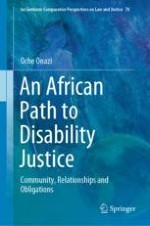2020 | OriginalPaper | Buchkapitel
4. Disability Justice in Legal and Political Philosophy: Is the Concept of Community a Missing Ideal?
verfasst von : Oche Onazi
Erschienen in: An African Path to Disability Justice
Aktivieren Sie unsere intelligente Suche, um passende Fachinhalte oder Patente zu finden.
Wählen Sie Textabschnitte aus um mit Künstlicher Intelligenz passenden Patente zu finden. powered by
Markieren Sie Textabschnitte, um KI-gestützt weitere passende Inhalte zu finden. powered by
Abstract
Despite isolated and unrelated antecedents, disability now features in the literature on justice in the leading tradition of legal and political philosophy. This chapter focuses on Martha Nussbaum’s capabilities approach , which is arguably the most important contribution to disability justice today. In discussing Nussbaum’s approach, the chapter focuses on whether it pays sufficient attention to the concept of community in the light of its centrality to the argument of this book. Although Nussbaum’s emphasis on the Aristotelian conception of person and the capability of affiliation implies an appreciation of the relational nature of human beings and the value of community, these features stand in tension with the political liberal and individualistic underpinnings of the capabilities approach. In contrast to scholars who have sought to expand the capabilities approach along robust group-based , collective or relational inclinations, the chapter argues that the reasons that have made it necessary to modify the approach point to the absence of and the need for a compelling and coherent alternative framework that systematically explains the advantages, as well as the law and policy implications of considering disability justice from a distinctly relational community ideal.
